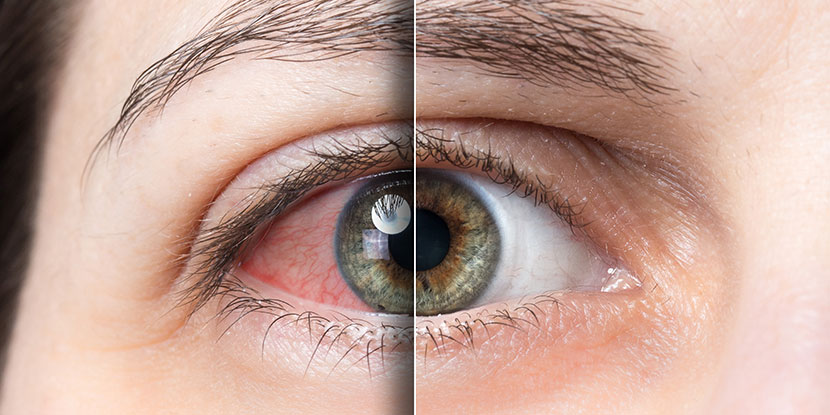DRY EYES
The condition known as dry eye disease happens when tears evaporate too quickly or aren’t producing enough lubricating film on the eye’s surface.

DRY EYES
What is Dry Eyes?
Some people may experience dryness, irritation, stickiness, stinging, burning, and watering from the eyes on hot summer days because they spend so much time indoors under air conditioning. It’s possible they’re developing a condition known medically as “Dry eye,” or Dry Eye Syndrome.
Why Dry Eyes?
To ensure your eyes feel and function normally, it’s important that they produce enough and high-quality tears.
Dry eye syndrome is caused by alterations in the oily (outer), water/aqueous (middle), and protein (inner) layers of the tear film (inner).
Air conditioners are the most common culprit in causing dry eye symptoms. The largest organ, the skin, through the immune system to the most delicate organ, the eyes, can all be affected by the artificial air and temperature change induced by air conditioners. Long-term exposure to such AC can also alter the lipid production from glands in the eyelids, causing both a change in the quality and quantity of tear film, and hence dry eyes. This is because the watery layer of the tear film evaporates more readily when the air around us is extremely dry, as is the case in low temperature settings in AC.
Tears have antibacterial properties, and dry eyes, which lack sufficient lubrication, are more susceptible to inflammation and infections, which can lead to a worsening of vision.
Causes of Dry Eye: What are the Reasons for Dry Eyes?
The other important causes of dry eye disease are:
Prolonged staring/usage of computer/mobile phones (Computer Vision Syndrome).
The natural aging process, especially menopause problems and hence women are more affected by dry eyes .
Certain medical conditions including diabetes, thyroid disorders and Vitamin A deficiency
Side effects of certain drugs like antihistamines can also be a cause of dry eye.
Laser eye surgery, though symptoms of dry eyes related to this procedure are usually temporary.
Tear gland damage from inflammation or radiation
Diseases that affect your ability to make tears, like Sjogren’s syndrome, rheumatoid arthritis, and collagen vascular diseases
Problems that don’t allow your eyelids to close the way they should.
Air pollution -people in metros like New Delhi, Mumbai, Kolkata and Chennai are few times more likely to be diagnosed with dry eye syndrome than the other towns with relatively little air pollution.

Major symptoms of dry eye disease:
Dry eyes and dry eye syndrome can cause a variety of uncomfortable feelings, including burning, dryness, grittiness, itching, aching, heaviness, watering, and blurred vision. For those who suffer from dry eyes, reading might slow down, and the pace of slowing rises with the severity of the condition.
Tips to Prevent Symptoms of Dry Eye Syndrome:
Below we have mentioned some of the many dry eye solutions like:
- Try to minimize and decrease the number of hours of using air-conditioned rooms, setting of AC temperature around 23 degree C and above is recommended.
- Avoid sitting with your face facing air conditioners, thereby preventing eyes from being directly exposed to air from air-conditioners.
- Place a small open bowl of fresh water in the corner of the room you sit with the air conditioner to maintain the humidity of the room, thereby preventing dry skin and dry eyes. So far, this has proven to be one of the best dry eye remedies.
- Another dry eyes home remedy is to drink enough liquids can also help prevent dry eye syndrome.
- Frequent conscious blinking when using computer or mobile phones which will help in the appropriate distribution of tear film.
- Have a traditional 7 – 8 hours of sleep, which will give adequate rest to the eyes.
- Consider wearing sunglasses or protective eye wear.
- Reach out to your eye doctor to diagnose the cause of your dry eyes, and follow recommendations and prescriptions from the Eye doctor on eye medications like lubricants, and /or antibiotics and/or anti-inflammatory eye drops and other in-office procedures which could help your body create and secrete more tears and better quality of tears and to decrease eye irritation and inflammation.
People with dry eye syndrome are more likely to get eye infections if they don’t take the necessary precautions to avoid them. If left untreated, dry eyes can cause substantial damage to the corneal surface (abrasion), a corneal ulcer, and other issues with the eye and vision.
As the saying goes, prevention is better than treatment. If you suspect you have dry eyes syndrome, see an eye doctor right once.
